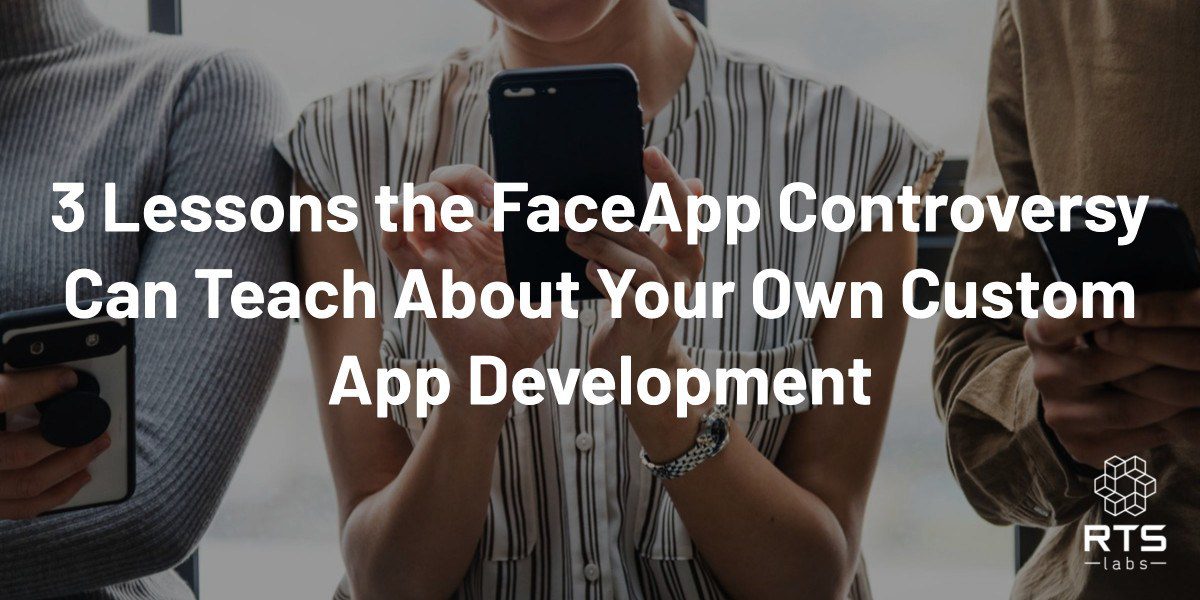Curiosity got the best of thousands of social media users this month – and potentially their data. Did you watch friend after friend take the #AgeChallenge and post photos of themselves as an older person? Did you give in and do it yourself? Did you then become enraged when you discovered this app was stealing all your photos and adding them to a Russian database for future facial recognition software?
There are actually a lot of layers to this story. However, beyond the obvious privacy and security concerns, there are also a number of takeaways for anyone involved in their own custom app development.
Is your custom application development headed for viral success or disaster?
A few days after the surge of old faces happened across Facebook, there was a social media storm over FaceApp’s vague, overarching terms of service and what it could mean for user privacy. What’s worse was the fear and conspiracy stories that ensued after someone on Twitter pointed out that the FaceApp developers are from Russia.
Fortunately, it turns out the story was a bit overblown. Several sites, including Forbes and BuzzFeed, have squelched the outrage with research that shows no malicious actions on the part of FaceApp.
However, there’s a lot to be learned from this incident as a developer – three lessons specifically you can apply even during the planning stages of any custom app development.
Lesson 1: How fun (and viral) AI technology can be in a custom application
Let’s just go ahead and call out the most obvious of lessons. First, people love filters and apps that alter their photos. You know, like all those Snapchat filters.
This isn’t the first time a FaceApp filter has gone viral. Remember back in 2017 when people were using the “hotness filter” or the filter that allowed you to add a smile to even the grumpiest of faces?
FaceApp’s AI technology allows you to age yourself, change your style, or even change your gender using “neural networks to modify a face on any photo while keeping it photorealistic.”
Cool, right? AI is becoming pervasive in just about every technology application you can think of. Maybe that means it’s time for you to harness this kind of technology in your next custom app development project. Just saying, if a Russian developer can use the technology to go viral on Facebook, you too can find a more fruitful application in your business. Take these five examples of how AI can serve up insights (and profits) in the food industry.
Lesson 2: How important it is to have clear terms of service for your custom app
There’s a more serious lesson to be learned here. The minute someone pointed out the broad, and frankly alarming, language in FaceApp’s terms of service was when people started to panic and question FaceApp’s intentions – starting a whole new viral trend for the app.
Here’s a snippet of the language that shook the internet:
“You grant FaceApp a perpetual, irrevocable, nonexclusive, royalty-free, worldwide, fully-paid, transferable sub-licensable license to use, reproduce, modify, adapt, publish, translate, create derivative works from, distribute, publicly perform and display your User Content and any name, username or likeness provided in connection with your User Content in all media formats and channels now known or later developed, without compensation to you. When you post or otherwise share User Content on or through our Services, you understand that your User Content and any associated information (such as your [username], location or profile photo) will be visible to the public.
“You grant FaceApp consent to use the User Content, regardless of whether it includes an individual’s name, likeness, voice or persona, sufficient to indicate the individual’s identity. By using the Services, you agree that the User Content may be used for commercial purposes. You further acknowledge that FaceApp’s use of the User Content for commercial purposes will not result in any injury to you or to any person you authorized to act on its behalf. You acknowledge that some of the Services are supported by advertising revenue and may display advertisements and promotions, and you hereby agree that FaceApp may place such advertising and promotions on the Services or on, about, or in conjunction with your User Content. The manner, mode and extent of such advertising and promotions are subject to change without specific notice to you. You acknowledge that we may not always identify paid services, sponsored content, or commercial communications as such.”
Dive into their privacy policy, and you’ll discover that you consent to the company sharing your data to third-party affiliates for the purpose of advertising.
While it is actually not that uncommon for app companies to use broad terms of service like FaceApp does, it doesn’t make it OK.
Clearly, from the social media storm that ensued once it was pointed out, it’s safe to say that consumers are beginning to care more about their privacy – especially given the wide-sweeping data breaches that continue to happen on a semi-regular basis.
Not having clear terms of service is a large part of what triggered the problem in the first place. The founder of the company had to clear the air and explain exactly what the app was doing with user data. FaceApp founder Yaroslav Goncahrov told Forbes:
“We only upload a photo selected by a user for editing. We never transfer any other images from the phone to the cloud … We might store an uploaded photo in the cloud. The main reason for that is performance and traffic: we want to make sure that the user doesn’t upload the photo repeatedly for every edit operation. Most images are deleted from our servers within 48 hours from the upload date.”
In the same article, he assured readers, “We don’t sell or share any user data with any third parties.”
Lesson 3: Do the right thing
Building (or thinking of building) an app that collects user data? Do the right thing and follow compliance and security standards.
Privacy and cybersecurity are top of mind for everyone these days. It seems there’s a new data breach every month, leaving millions of consumers at risk of identity theft and fraud.
FaceApp’s privacy policy is actually not GDPR compliant. Not only can not being GDPR compliant can cause major legal problems for the company down the road – not following the highest standard when it comes to user data is just irresponsible.
Let’s face it, users don’t dive into the legalese of user agreements like they should. There are probably dozens of apps on your phone that collect data in the same way. FaceApp just happened to be the one that got called out this time.
This is our call to developers that when it comes to custom app development, just do the right thing. Protect your users, and don’t use sneaky means of collecting data just to sell it to third parties. You know, like the Cambridge Analytica data scandal that prompted people to start deleting their Facebook accounts.
What to consider when developing your own custom application
What are the best practices you want to follow when embarking on customer application development? How do you decide if a custom application is truly what you – and your customers – need?
Get answers in this informative whitepaper about how to decide if customer app development is worth the investment – as well as tips for getting the best ROI you can.






